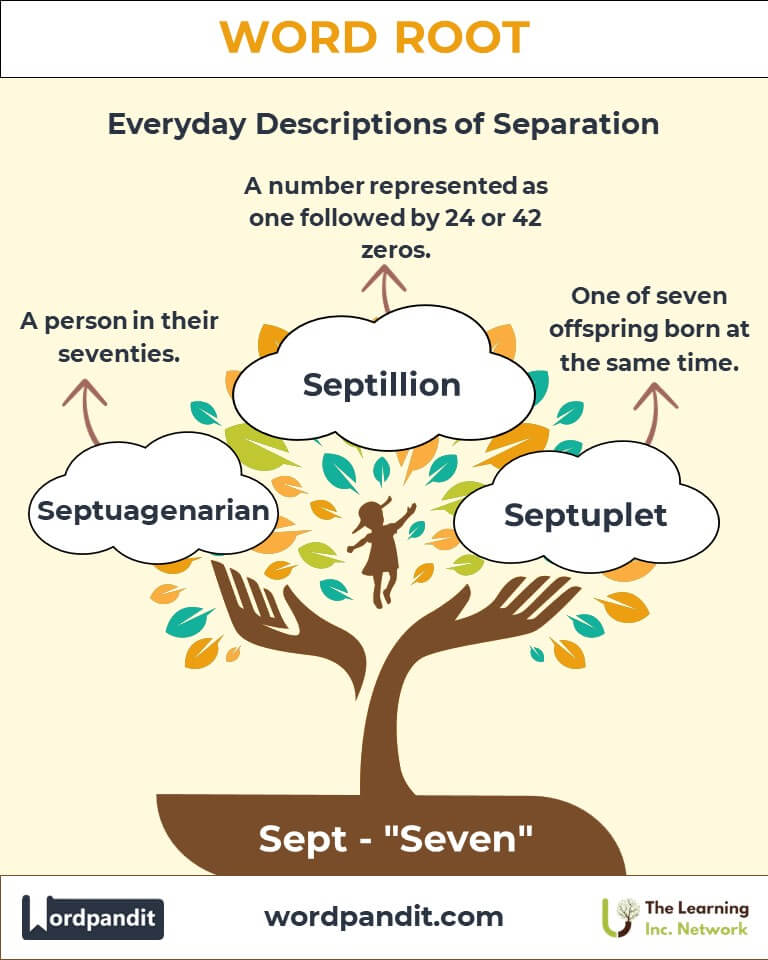Sept: The Root of Seven in Language and History
Byline: Discover the fascinating story of the root "sept," derived from Latin, meaning "seven." From its presence in historical month names like September to its role in describing multiples of seven, "sept" connects language, numbers, and culture in intriguing ways.

Table of Contents
- Introduction: The Significance of "Sept"
- Etymology and Historical Journey
- Mnemonic: Unlocking the Power of "Sept"
- Common "Sept"-Related Terms
- "Sept" Through Time
- "Sept" in Specialized Fields
- Illustrative Story: "Sept" in Action
- Cultural Significance of the Root "Sept"
- The "Sept" Family Tree
- FAQs About the "Sept" Word Root
- Test Your Knowledge: "Sept" Word Root Quiz
- Conclusion: The Legacy of "Sept"
1. Introduction: The Significance of "Sept"
The word root "sept," pronounced as "se-pt," stems from the Latin word septem, meaning "seven." This root has left its mark on language, calendar systems, and numeric classifications, symbolizing completeness, cycles, and unity in different cultures. The number seven, often considered mystical or sacred, brings this root to life through its enduring presence in history and modern language.

2. Etymology and Historical Journey
The root "sept" traces its origins to the Latin septem, meaning "seven." This Latin root appears in various languages, such as French (sept) and Italian (sette). It also shaped the Roman calendar, where September, originally the seventh month, retained its name even after the calendar reformation by Julius Caesar, which added January and February to the beginning of the year. The association of "sept" with the numeral seven persists in mathematical and linguistic contexts.
3. Mnemonic: Unlocking the Power of "Sept"
To remember "sept" and its meaning:
- Visualize a heptagon (a seven-sided shape) and imagine each side representing a day of the week, linking "sept" to the number seven.
Mnemonic Device: "Sept starts the seven-step staircase of days and cycles."
4. Common "Sept"-Related Terms
- Septuplet (sep-tuh-plet): One of seven offspring born at the same time.
Example: "The birth of septuplets astonished the medical community." - September (sep-tem-ber): The ninth month of the Gregorian calendar, originally the seventh month in the Roman calendar.
Example: "The autumn equinox occurs in late September." - Septennial (sep-ten-ee-uhl): Occurring every seven years.
Example: "The council held a septennial celebration to honor its founding." - Septuagenarian (sep-tuh-juh-nair-ee-uhn): A person in their seventies.
Example: "The septuagenarian continued to inspire younger generations with his wisdom." - Septillion (sep-til-yuhn): A cardinal number represented as one followed by 24 zeros (US) or 42 zeros (British).
Example: "Astrophysicists estimate the universe contains septillions of stars."
5. "Sept" Through Time
- September: Originally the seventh month in the Roman calendar, it retained its name despite becoming the ninth month in the Gregorian system.
- Septuagint: A translation of the Hebrew Bible into Greek, named for the seventy scholars who completed it. This highlights the root’s presence in historical and religious texts.
6. "Sept" in Specialized Fields
- Biology: Septuplet: Refers to seven offspring born at one time, often studied in genetics and reproductive science.
Importance: Rare occurrences like septuplets draw attention to fertility treatments and biological phenomena. - Mathematics: Septillion: Represents vast quantities in numerical systems.
Usage: Essential in astronomical calculations and data analysis. - History and Culture: Septennial: Marks seven-year cycles in traditions and governmental terms.
Example: Ancient cultures often attributed sacred significance to seven-year intervals.
7. Illustrative Story: "Sept" in Action
In the ancient kingdom of Septavia, every seven years, the people celebrated the Festival of Seven Stars. This septennial tradition honored the constellation Pleiades, symbolizing unity and balance. The festival featured seven days of music, dance, and storytelling, each inspired by the theme of seven—a tribute to the root "sept" and its cultural resonance.
8. Cultural Significance of the Root "Sept"
The number seven has held symbolic importance across civilizations. In Christianity, seven represents divine perfection (e.g., seven days of creation). In numerology, it is often seen as a mystical number linked to intuition and inner wisdom. "Sept" has permeated language, rituals, and beliefs, solidifying its place in cultural and spiritual narratives.

9. The "Sept" Family Tree
- Hepta- (Greek: "seven"): Example: Heptagon (a seven-sided figure).
- Septuagint (Latin: "seventy"): Example: The Greek translation of the Hebrew Bible.
- Septem- (Latin: "seven"): Example: Septemvirate (a ruling council of seven).

10. FAQs About " Sept"
Q: What does "sept" mean?
A: "Sept" means "seven" and is derived from the Latin word septem. This root is most commonly seen in terms related to the number seven, such as "septuplets" or "September," though its influence spans both historical and modern contexts.
Q: Why is September the ninth month if 'sept' means seven?
A: Originally, September was the seventh month of the Roman calendar, which began in March. When January and February were added during calendar reforms, September became the ninth month but retained its name, reflecting its historical placement.
Q: What are septuplets?
A: Septuplets are seven offspring born from the same pregnancy. While extremely rare, such births are often associated with fertility treatments or other medical advancements in reproductive health.
Q: How is "septillion" used in modern contexts?
A: "Septillion" represents a number followed by 24 zeros in the U.S. system (or 42 zeros in the British system). It is primarily used in astronomy, physics, and other sciences when describing extraordinarily large quantities, such as the number of stars in the universe.
Q: What is a septennial event?
A: A septennial event occurs every seven years. Such cycles were significant in many cultures and traditions, symbolizing renewal or milestones. For instance, in ancient Rome, some religious or civic events followed septennial patterns.
11. Test Your Knowledge: " Sept " Mastery Quiz
1. What does the root "sept" mean?
2. Which word describes a group of seven offspring?
3. What is a septennial event?
4. Which historical translation is associated with "sept"?
5. How many zeros are in a septillion (US system)?
12. Conclusion: The Legacy of "Sept"
The root "sept" continues to shape language, history, and culture, symbolizing the enduring importance of the number seven. From the Gregorian calendar to symbolic traditions, "sept" connects us to the rhythms of life and the mysteries of numbers. Explore its legacy and let "sept" inspire your understanding of the world's linguistic and numeric wonders.












